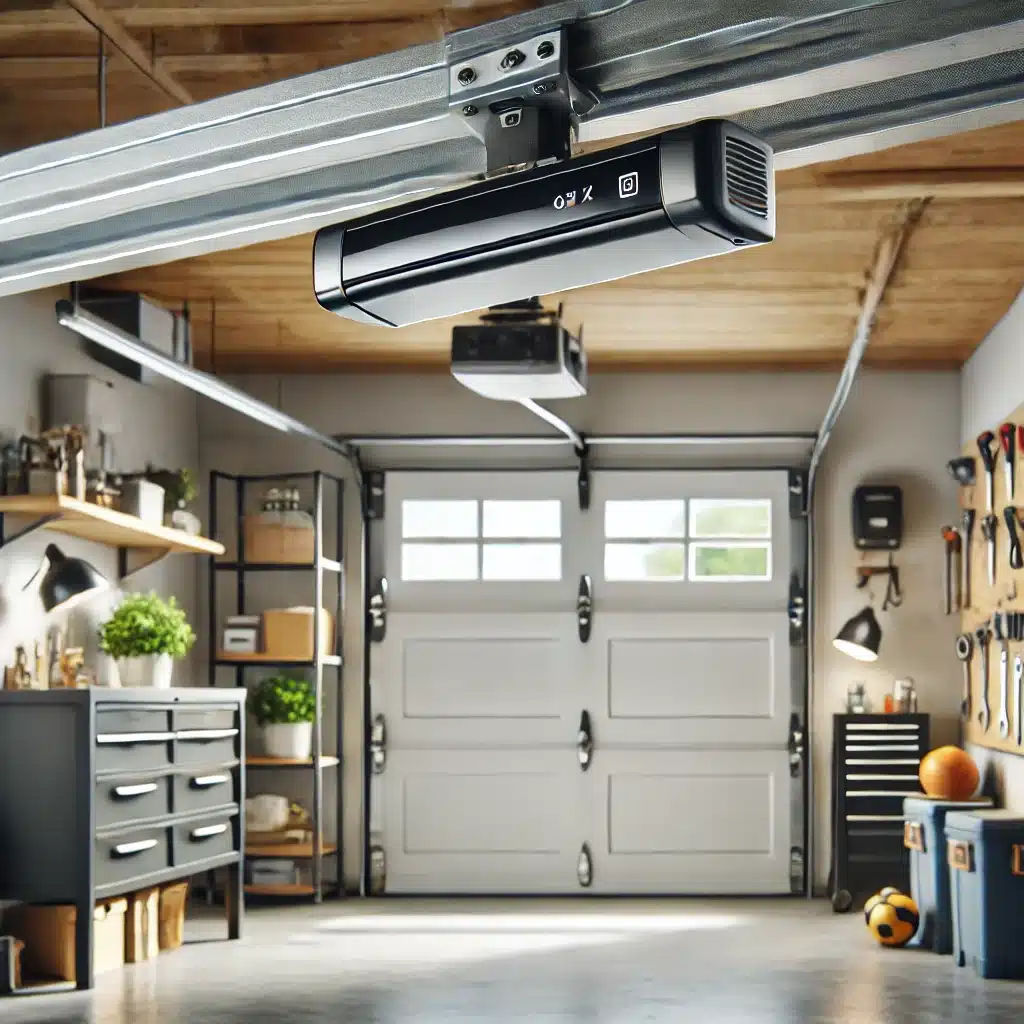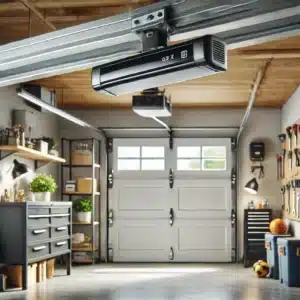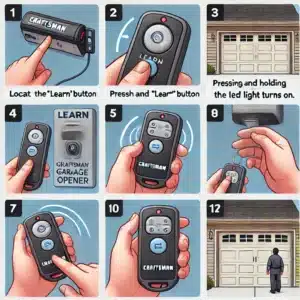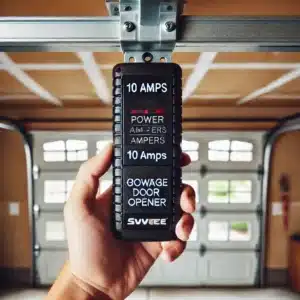When deciding on the right horsepower (HP) for your garage door opener, it’s essential to understand its impact on performance and longevity. The HP determines how effectively the opener can lift and lower your garage door. An underpowered opener will strain to lift the door, causing wear and tear, while an overpowered one may be unnecessarily costly without added benefits. Choosing the correct HP ensures smooth operation, extending the life of your garage door system and enhancing safety and reliability. Many homeowners are uncertain about the required HP, but an informed decision can save you time, money, and frustration. Read on to discover how to choose the perfect HP for your needs.

Understanding Horsepower (HP) in Garage Door Openers
Horsepower (HP) measures the power output of a motor. For garage door openers, HP indicates the motor’s strength in lifting and lowering your garage door. The right HP ensures smooth and efficient operation without straining the motor.
Why HP Matters for Garage Door Openers
- Efficiency: An appropriately powered motor opens and closes your garage door easily. A weak motor struggles, leading to slower operation and increased wear and tear.
- Durability: An overworked motor with insufficient horsepower wears out quickly, resulting in frequent breakdowns and a shorter lifespan for your opener.
- Safety: A properly powered opener handles your door’s weight reliably, reducing the risk of mechanical failure that could cause accidents or damage.
- Cost-Effectiveness: While higher HP motors are more expensive, choosing the right HP ensures longevity and performance, saving you money on repairs and replacements.
Common HP Ratings for Residential Garage Door Openers
- 1/3 HP: Suitable for lightweight, single-car garage doors made of aluminum or other light materials. Ideal for small, basic garage doors with infrequent use.
- 1/2 HP: The most common rating for residential openers, strong enough for standard double-car garage doors made of materials like steel. Balances power and affordability, ideal for most homeowners.
- 3/4 HP or Higher: Designed for heavy, insulated, or wooden garage doors. Suitable for large, heavy, or frequently used doors. Also ideal for doors with added insulation, significantly increasing their weight.
Understanding these HP ratings and their applications helps you make an informed decision when choosing a garage door opener. Match the motor’s power with your garage door’s specific needs to ensure a smooth and efficient operation for years.
Factors to Consider When Choosing HP
Choosing the right horsepower (HP) for your garage door opener is more than just picking a number off a chart. It’s about understanding the specific needs of your garage door and how it fits into your daily routine. Here are the key factors to consider:
Weight and Size of Your Garage Door
The most critical factor in determining the appropriate HP for your garage door opener is the weight and size of your garage door.
- Lightweight, Single-Car Garage Doors: If you have a single-car garage door made of lightweight materials like aluminum or thin steel, a 1/3 HP opener will likely be sufficient. These doors are easy to lift and don’t require a lot of power.
- Standard Double-Car Garage Doors: For a typical double-car garage door, which is heavier and larger, a 1/2 HP opener is the most common choice. This power level is capable of handling the additional weight and size without straining the motor.
- Heavy, Insulated, or Wooden Garage Doors: If your garage door is made of wood, has added insulation, or is particularly large, you’ll need a 3/4 HP or higher opener. These doors are significantly heavier and require more power to operate smoothly.
Frequency of Use
Another important consideration is how often you use your garage door.
- Low to Moderate Use: If you open and close your garage door a few times a day, a 1/2 HP opener should be sufficient for most standard doors. This level of use is typical for many households.
- High Use: If your garage door sees heavy use—perhaps you have multiple drivers in the household, or your garage serves as the primary entrance to your home—you’ll benefit from a higher HP opener. A 3/4 HP motor can handle frequent operation without wearing out prematurely, ensuring consistent performance even with heavy daily use.
Insulation and Material of the Garage Door
The material and insulation of your garage door can significantly impact its weight and, consequently, the horsepower needed.
- Light Materials (Aluminum, Thin Steel): Doors made from these materials are lighter and typically don’t require as much horsepower. A 1/3 HP opener can often handle these doors easily.
- Heavy Materials (Wood, Thick Insulated Steel): Wooden doors and those with heavy insulation are much heavier. They require more power to operate, so a 3/4 HP or higher opener is usually necessary to ensure reliable function.
Additional Features
Modern garage door openers come with a range of additional features that can influence your decision.
- Battery Backup: If you live in an area prone to power outages, a garage door opener with a battery backup is essential. These systems require a bit more power to ensure they can lift the door even during an outage.
- Smart Home Integration: Many new garage door openers offer smart home features, allowing you to control and monitor your door from your smartphone. While these features don’t directly impact the HP needed, it’s worth considering if you want a more advanced system that might also include stronger motors for reliability.
- Noise Reduction: Belt drive openers are typically quieter than chain drive models, making them a good choice for attached garages. Higher HP models often come with better noise-reduction technologies.
By taking into account the weight and size of your garage door, how often you use it, the materials and insulation it includes, and any additional features you want, you can choose the perfect HP for your garage door opener. This ensures you get a product that not only meets your needs but also provides reliable and efficient operation for years to come.
HP Recommendations Based on Door Type
Selecting the right horsepower (HP) for your garage door opener depends heavily on the type of garage door you have. Each type of door has unique requirements based on its weight, size, and material. Here’s a detailed guide to help you match the appropriate HP with your specific door type:
Light Garage Doors (Single, Aluminum): 1/3 HP
For light garage doors, typically those that are single-car and made of aluminum or other lightweight materials, a 1/3 HP garage door opener is usually sufficient. These doors are easy to lift and don’t put a lot of strain on the motor, making a 1/3 HP opener an economical and efficient choice.
- Single-Car Garage Doors: These doors are narrower and lighter, often used for single-vehicle garages. The reduced weight means that a lower HP motor can easily handle the lifting and lowering of the door without any issues.
- Aluminum or Lightweight Materials: Aluminum doors are popular because they are durable yet lightweight. A 1/3 HP opener has enough power to operate these doors smoothly, ensuring reliable performance without the need for a more powerful (and more expensive) motor.
Standard Garage Doors (Double, Steel): 1/2 HP
If you have a standard double-car garage door, typically made of steel, a 1/2 HP opener is the most common and recommended choice. These doors are heavier and wider, requiring more power to operate efficiently.
- Double-Car Garage Doors: These doors are designed to accommodate two vehicles side by side. The increased width and weight of these doors mean that a 1/3 HP opener would struggle, but a 1/2 HP motor provides the right balance of power and efficiency.
- Steel Doors: Steel is a popular material for garage doors due to its strength and durability. A 1/2 HP opener is strong enough to lift and lower a steel door reliably, ensuring smooth operation and a longer lifespan for both the door and the opener.
Heavy Garage Doors (Wooden, Insulated): 3/4 HP or Higher
For heavier garage doors, like those made of wood or with significant insulation, a 3/4 HP or higher opener is necessary to ensure smooth and reliable operation.
- Wooden Garage Doors: Wooden doors are aesthetically pleasing and offer great insulation but are much heavier than aluminum or steel doors. A 3/4 HP opener can handle the added weight, ensuring the door opens and closes without straining the motor.
- Insulated Doors: Insulated garage doors provide better energy efficiency and noise reduction but add considerable weight. A 3/4 HP opener or higher is recommended to manage the extra weight of the insulation, ensuring efficient motor operation without undue stress.
- Large or Custom Doors: Custom-made or particularly large garage doors likely fall into the heavy category. In these cases, a 1 HP opener or higher might be necessary to handle the additional size and weight effectively.
Matching the horsepower of your garage door opener to the type and weight of your door ensures optimal performance and longevity. Whether you have a lightweight aluminum door, a standard steel double door, or a heavy wooden or insulated door, choosing the right HP significantly impacts the long-term functionality of your garage door system.
Popular Garage Door Opener Models
Choosing the right horsepower (HP) for your garage door opener is only part of the equation. It’s also important to select a reliable model from a reputable brand. Here’s an overview of some top brands and models in each HP category, highlighting their key features and benefits to help you make an informed decision.
Light Garage Doors (Single, Aluminum): 1/3 HP
Chamberlain C203
- Key Features:
- MyQ Technology: Allows for remote operation via smartphone.
- Durable Chain Drive: Provides reliable performance.
- Safety Sensors: Prevents the door from closing on objects.
- MyQ Technology: Allows for remote operation via smartphone.
- Benefits:
- Ideal for lightweight, single-car garage doors.
- Affordable and easy to install.
- Integration with smart home systems for added convenience.
- Ideal for lightweight, single-car garage doors.
Genie ChainDrive 550
- Key Features:
- Intellicode Security: Prevents unauthorized access.
- 5-Piece Rail System: Quick and easy installation.
- Pre-Programmed Remote: Ready to use right out of the box.
- Intellicode Security: Prevents unauthorized access.
- Benefits:
- Reliable and secure for light garage doors.
- Straightforward setup process.
- Strong and durable chain drive system.
- Reliable and secure for light garage doors.
Standard Garage Doors (Double, Steel): 1/2 HP
LiftMaster 8165W
- Key Features:
- Built-In Wi-Fi: Allows for remote control with MyQ app.
- PosiLock: Ensures the door stays locked when closed.
- Chain Drive System: Strong and durable.
- Built-In Wi-Fi: Allows for remote control with MyQ app.
- Benefits:
- Perfect for standard double-car garage doors.
- Enhanced security features.
- Seamless integration with smart home devices.
- Perfect for standard double-car garage doors.
Chamberlain B550
- Key Features:
- Belt Drive System: Quieter operation compared to chain drives.
- MyQ Technology: Remote control and monitoring.
- Battery Backup: Ensures operation during power outages.
- Belt Drive System: Quieter operation compared to chain drives.
- Benefits:
- Smooth and quiet performance, ideal for attached garages.
- Reliable operation even during power outages.
- Easy-to-use smartphone control.
- Smooth and quiet performance, ideal for attached garages.
Heavy Garage Doors (Wooden, Insulated): 3/4 HP or Higher
LiftMaster 8500W
- Key Features:
- Wall-Mount Design: Frees up ceiling space.
- Battery Backup: Operates during power failures.
- MyQ Technology: Remote control via smartphone.
- Wall-Mount Design: Frees up ceiling space.
- Benefits:
- Perfect for heavy and custom doors.
- Space-saving design.
- Reliable performance with smart features.
- Perfect for heavy and custom doors.
Genie PowerLift 900
- Key Features:
- Direct Drive Motor: Provides powerful and quiet operation.
- Safe-T-Beam System: Infrared beam prevents accidents.
- Intellicode Security: Enhanced security for your home.
- Direct Drive Motor: Provides powerful and quiet operation.
- Benefits:
- Strong enough for the heaviest garage doors.
- Quiet and smooth operation.
- Advanced safety and security features.
- Strong enough for the heaviest garage doors.
Chamberlain B970
- Key Features:
- Ultra-Quiet Belt Drive: Ideal for attached garages.
- Battery Backup: Ensures operation during outages.
- MyQ Technology: Control and monitor your garage from anywhere.
- Ultra-Quiet Belt Drive: Ideal for attached garages.
- Benefits:
- Powerful 1.25 HP motor for heavy doors.
- Extremely quiet operation.
- Smart home integration for added convenience.
- Powerful 1.25 HP motor for heavy doors.

Installation and Maintenance Tips
Proper installation and regular maintenance are crucial for ensuring your garage door opener operates smoothly and lasts for years. Here’s a comprehensive guide to help you through the process.
Basic Installation Steps
Installing a garage door opener might seem complex, but a step-by-step approach makes it manageable. Here’s how to do it:
- Read the Manual: Start by thoroughly reading the installation manual provided by the manufacturer to understand the specific requirements and steps for your model.
- Gather Tools and Parts: Collect necessary tools like a drill, ladder, level, wrenches, and screwdrivers. Ensure all parts listed in the manual are included.
- Assemble the Opener: Follow the instructions to assemble the opener, typically connecting the rail to the motor unit and attaching the trolley.
- Mount the Opener: Position the opener on the ceiling, centered above the garage door. Use the provided brackets and screws to secure it, ensuring it is level and firmly attached.
- Attach the Rail to the Garage Door: Connect the rail to the garage door bracket. Ensure correct alignment for smooth operation.
- Install the Safety Sensors: Mount safety sensors on either side of the garage door, about six inches above the ground, ensuring they are aligned for effective communication.
- Connect the Opener to Power: Plug in the opener and connect additional wiring for controls or lights as per the manufacturer’s guidelines.
- Program the Remote and Keypad: Sync remote controls and keypad with the opener by pressing the appropriate buttons on the motor unit and the remote.
- Test the Opener: Open and close the garage door several times to ensure everything works correctly. Adjust the travel limits and force settings as needed.
Maintenance Tips to Prolong the Life of Your Garage Door Opener
Regular maintenance can extend the life of your garage door opener and ensure safe, efficient operation. Here are some essential tips:
- Lubricate Moving Parts: Apply a silicone-based lubricant to rollers, hinges, and tracks to reduce friction and wear, ensuring smooth operation.
- Check the Balance: Periodically disconnect the opener and manually lift the door halfway. If it doesn’t stay in place, the springs may need adjustment.
- Inspect the Tracks: Keep tracks free from debris and ensure they are properly aligned to prevent binding and strain on the opener.
- Test the Safety Sensors: Regularly place an object in the door’s path and attempt to close it. The door should reverse immediately. If not, clean and realign the sensors.
- Tighten Hardware: Periodically check and tighten all bolts and screws to ensure everything remains secure.
- Replace Remote Batteries: If the remote works intermittently, replace the batteries. Keep spares on hand to avoid disruptions.
Safety Considerations
Safety should be a priority when installing and maintaining your garage door opener:
- Disconnect Power During Installation: Always disconnect the power to prevent accidental activation during installation or maintenance.
- Follow Manufacturer’s Instructions: Adhere to the manufacturer’s guidelines for safe and proper operation.
- Use Safety Features: Ensure safety features, like the auto-reverse function and safety sensors, are working correctly to prevent accidents and injuries.
- Keep Children and Pets Away: During installation and maintenance, keep children and pets away from the garage door area.
- Regular Professional Inspections: Consider annual professional inspections to identify and address issues not apparent to the untrained eye.
By following these tips, you can ensure your garage door opener operates safely and efficiently for many years. Proper care and attention to detail will save you time and money and keep your garage door system functioning reliably.
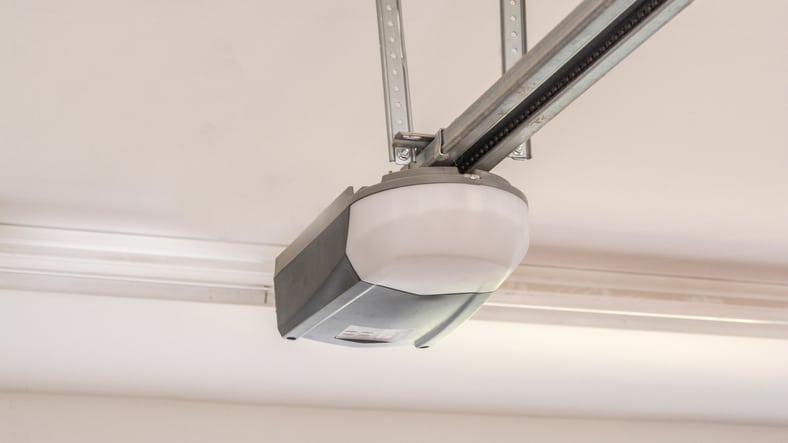
Frequently Asked Questions on HP Garage Door Opener Do I Need?
What HP Garage Door Opener Do I Need for a Double Garage Door?
Typically, a 1/2 HP opener is sufficient for a standard double garage door. This power level handles the weight and size of most double garage doors, ensuring smooth and reliable operation without overworking the motor.
Can I Use a Higher HP Opener Than Recommended?
Yes, you can use a higher HP opener than recommended, but it’s usually unnecessary and may cost more without added benefits. A more powerful motor won’t harm your garage door but may be an unnecessary expense. Match the HP with the door’s weight and usage frequency for optimal performance and cost-efficiency.
How Long Does a Garage Door Opener Last?
With proper maintenance, a garage door opener can last 10-15 years. Regular upkeep, such as lubricating moving parts, checking the balance, and tightening hardware, extends the lifespan of your opener, prevents premature wear and tear, and minimizes the need for garage door repair.
Are Higher HP Garage Door Openers Noisier?
Not necessarily; noise level depends more on the type of drive (chain, belt, screw) than HP. Belt drive openers are generally quieter than chain drives, regardless of horsepower. If noise is a concern, consider the type of drive mechanism rather than focusing solely on HP.
Do HP Ratings Affect the Speed of Opening and Closing?
Not directly; speed is typically controlled by the motor’s design rather than its HP rating. Most garage door openers have a standard speed of operation, and increasing HP won’t necessarily make the door open or close faster. Instead, HP ensures the opener can handle the door’s weight efficiently.
Conclusion
Selecting the appropriate horsepower (HP) for your garage door opener is crucial for smooth and reliable operation. The right HP matches the weight and size of your garage door and considers factors such as usage frequency and door material. Here’s a quick recap of why making the right choice is so important:
- Efficiency and Performance: Choosing the correct HP ensures efficient operation, minimizes motor strain, and prevents premature wear. This leads to a longer lifespan for your opener and fewer maintenance issues over time.
- Safety and Reliability: An appropriately powered opener is less likely to fail, providing consistent performance and enhancing home safety. This is particularly important for heavier doors, where underpowered openers might struggle and pose safety risks.
- Cost-Effectiveness: While higher HP models are available, it’s generally more cost-effective to select the right power level for your specific door. Higher HP openers can be more expensive and unnecessary for lighter doors, offering no additional benefits.
Key Considerations
- Door Weight and Size: Match the HP to your door’s weight and dimensions.
- Usage Frequency: For frequently used doors, consider a higher HP to ensure durability.
- Material and Insulation: Heavier materials and insulated doors require more power.
- Additional Features: Look for features like battery backup, smart home integration, and noise reduction to enhance functionality and convenience.
By carefully evaluating these aspects, you can choose a new garage door opener that meets your needs and ensures reliable performance. Explore more about garage door openers and make an informed decision for your home. Dive deeper into our resources to find the perfect match for your garage door, ensuring seamless operation and enhanced security for years to come.

